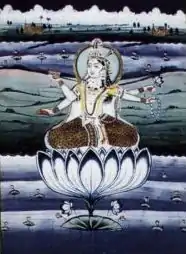Rag Lalit
Rāg Lalit is a studio album by Indian classical musician Ram Narayan, released in 1989. Recorded December 3, 1987, in Wyastone Leys near Monmouth, Wales, the album features a performance of the serene dawn raga Lalit on sarangi. Narayan performs a long non-metrical introduction to unfold the raga, during which he adds a pulse, until he is joined by tabla to perform a composition.
| Rāg Lalit | |
|---|---|
 album cover art | |
| Studio album by | |
| Released | 1989 |
| Recorded | December 3, 1987 |
| Genre | Hindustani classical music |
| Length | 73:43 |
| Label | Nimbus |
Origin
The album consists of a single track performance of the raga Lalit. Lalit is commonly described as calm and devotional and is performed at dawn.[1] Neil Sorrel portrayed Lalit as conveying a feeling of instability and connects this to the performance time, when night changes into day.[2]
Recording and artwork
Rāg Lalit was recorded in a single take in Wyastone Leys near Monmouth, Wales, on December 3, 1987, and includes the tuning of the sarangi's sympathetic strings through plucking.[2] In the performance, Narayan plays a long alap (non-metrical introduction) and a jor (performance with pulse) that increases in speed and range and makes use of gamaks (note oscillations).[2] Suresh Talwalkar, a frequent accompanist of Narayan, joins in playing a gat (composition with rhythmic pattern provided by the tabla) in the rhythmic 16-beat cycle tintal, which is separated into four groups of four beats.[2] When Talwalkar plays a solo, the sarangi repeats the melody.[2] The performance was mastered in England, but not edited.[2] In the same session that produced Rāg Lalit, the 1987 album Rāg Bhūpāl Toṛī, Rāg Paṭdīp was recorded.[3]
The album cover features a 19th-century painting of the goddess Tripura Sundari,[4] also called Lalita. A picture of Narayan playing the sarangi is on the back of the album, along with a quote of Yehudi Menuhin praising Narayan.
Reception
| Review scores | |
|---|---|
| Source | Rating |
| Allmusic | |
| New Straits Times | (favorable)[5] |
Allmusic critic Ken Hunt gave the album a maximum five star rating and called it "a magical performance",[3] and R. S. Murthi of the New Straits Times argued that Narayan utilized his musical knowledge on the album to "stunning effect".[5]
Track listing
- "Rāg Lalit" – 73:43
Personnel
- Ram Narayan – sarangi
- Suresh Talwalkar – tabla
- Neil Sorrell – tambura
- Elizabeth Haddon – tambura
References
- Bor, Joep; Rao, Suvarnalata; Van der Meer, Wim; Harvey, Jane (1999). The Raga Guide. Nimbus Records. p. 104. ISBN 0-9543976-0-6.
- Sorrell, Neil (1989). Rāg Lalit (CD booklet). Ram Narayan. England: Nimbus Records. NI 5183.
|access-date=requires|url=(help) - Hunt, Ken. "RÆg Lalit - Review". Allmusic. Retrieved 2009-06-30.
- "The Goddess Tripurasundari". Bridgeman Art Library. Retrieved 2015-01-30.
- Murthi, R. S. (1992-06-07). "Rhythm of the universe". New Straits Times. p. 11.